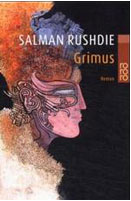|
REVIEW
The most obvious thing to say about Salman Rushdie's first novel is this: if you have read no other Rushdie, put it down now and return to it after you have read one of his other novels.
Grimus only resembles Rushdie's other work in a nebulous and tenuous way. It is not as complex, rich, or engrossing to read as his later work. That said, this book is probably best left to Rushdie completists; if you want to read absolutely everything he's written, then go ahead. Otherwise, approach this book with caution: it alone does not fairly represent the Rushdie that is considered one of the best writers of the current generation.
Not to say that this is a bad book. By no means is it bad. It just isn't exceptional. The writing is somewhat fumbling, and even a little clumsy and overbearing in places. Rushdie has said that he found his voice while writing his second novel, "Midnight's Children" and Grimus reads like someone who is searching for a path or a voice, not someone who is on firm footing; this novel provides direct evidence of Rushdie's statement.
The bizarre story deals with immortality, created worlds, other dimensions both inner and outer, and outcasts. Flapping Eagle, or Joe-Sue, or Born-from-Dead is an Axona indian who has a lighter complexion than the rest of his people; add to this that his mother died seconds after he was born and you get an outcast. He is not easily accepted, but his sister, Bird-Dog, protects him. She also presents him with the elixir of eternal life (in the form of a yellow liquid) and she disappears mysteriously from the land of the Axona. Flapping Eagle is then exiled from his people, and wanders the world for centuries before falling through a gate in the Mediterranean that leads to "Calf Island" while attempting suicide (he is also in the throes of searching for his sister, Bird-Dog, who has also drank the yellow liquid, and apparently wandered off with a man named "Sispy"). He floats under the rocking chair of Virgil Jones, who recognizes something in Flapping Eagle, and takes him in. Flapping Eagle gets Virgil to admit that he has seen Bird Dog on Calf Island, and decides to go up Calf-Mountain, but Virgil must accompany him because of the "Grimus Effect". This effect consists of a "whine" that pervades the mountain and, for lack of a better explanation, drives people mad who succumb to it for too long a time. At the top of Calf Mountain sits the town of "K", in which live people who deal with the effect by obsessing over various things. Here Flapping Eagle and Virgil part ways: Flapping Eagle goes to an upper-class type existence and gets intimately involved with two married women, and Virgil retreats to the "House of the Rising Son" (a brothel). When people begin dying in the town of "K" (which is doubly shocking because everyone in K has tasted the yellow liquid of immortality), they turn against Flapping Eagle, and he and Virgil decide they must join forces and face Grimus, who supposedly resides at the cloud-obscured summit of Calf Mountain. This leads to the novel's climax.
Some feminist critics have lashed out at Rushdie for the depiction of women in this novel. It's not hard to understand why. Most of the women characters are either prostitutes or dizzy and demented with love for a man. One example is the character of Liv, who is a black-velied beauty who uses intimacy as a tool for revenge. Many of the women in this novel all come off as somewhat hollow, weak, and one-sided characters. This adds to the second rate and unexceptional tone that pervades the entire novel. This is something Rushdie has risen above in his later work, and judging him on this issue by this book alone would be a great injustice.
In the end Grimus is not a bad book, but as a book by Salman Rushdie it is disappointing. It is extremely hard to believe that about five years later Rushdie would publish "Midnight's Children" - which is as rich and dazzling as Grimus is mediocre
|

